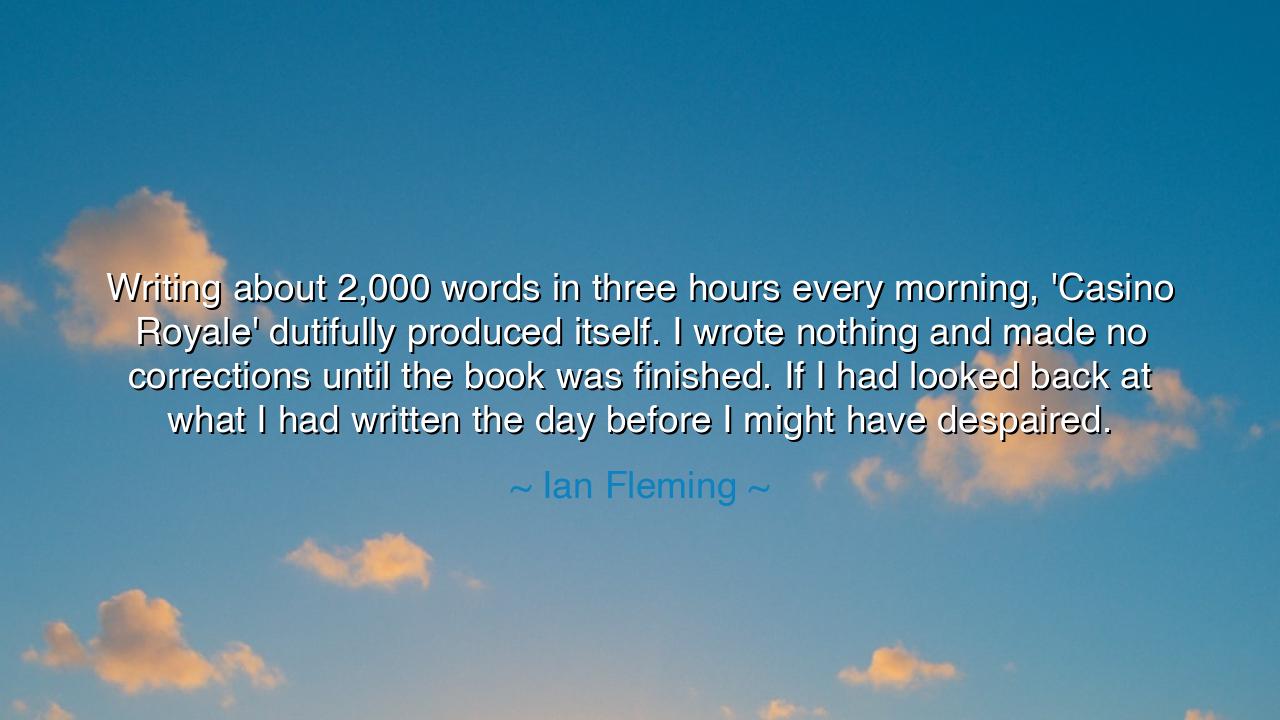
Writing about 2,000 words in three hours every morning, 'Casino
Writing about 2,000 words in three hours every morning, 'Casino Royale' dutifully produced itself. I wrote nothing and made no corrections until the book was finished. If I had looked back at what I had written the day before I might have despaired.






When Ian Fleming reflected, “Writing about 2,000 words in three hours every morning, Casino Royale dutifully produced itself. I wrote nothing and made no corrections until the book was finished. If I had looked back at what I had written the day before I might have despaired,” he unveiled a timeless truth about the nature of creation and perseverance. His words speak of discipline, of surrender to the flow of work, and of the courage to press forward without being paralyzed by doubt. For in writing, as in all great labors, it is not perfection in the moment that matters, but the faithful completion of the journey.
The origin of this wisdom comes from Fleming’s own experience in the early 1950s, when he sat down in Jamaica to craft his first novel, Casino Royale. A former journalist and intelligence officer, he knew the value of deadlines and momentum. Thus he disciplined himself: three hours, 2,000 words, each morning. He forbade himself to look backward, knowing that to dwell on yesterday’s words was to risk the quicksand of despair. Instead, he marched forward, one page at a time, until a story that would birth James Bond emerged into the world.
The heart of his teaching lies in the refusal to be imprisoned by perfection. Fleming admits, “If I had looked back… I might have despaired.” How many dreams have perished because their creators judged too soon, weighed their first steps against impossible standards, and abandoned the work before it bloomed? Fleming chose instead to silence his inner critic, to let the act of writing flow, raw and uncorrected, trusting that refinement would come later. His discipline allowed him to finish what many others only begin.
The ancients themselves practiced such wisdom. Consider Homer, whose epics were not written in one polished draft but recited, refined, and carried forward until the tales of gods and heroes stood complete. Or Michelangelo, who once said he carved stone not by knowing each detail in advance, but by chipping away day by day until the figure revealed itself. So too did Fleming: he carved his story through steady forward motion, refusing to be halted by the imperfections of the moment.
History offers us also the example of Charles Dickens, who published many of his works in serial form. Chapters were written quickly, under pressure, without endless revisions. Yet from this flow of urgent labor came masterpieces that continue to endure. Dickens, like Fleming, knew that sometimes the flame of creation burns brightest when it is not smothered by hesitation. The lesson is clear: momentum often matters more than meticulousness in the early stages of creation.
From Fleming’s reflection we learn that discipline conquers despair. To create anything—whether book, painting, business, or life’s new chapter—one must sometimes forbid the gaze backward and march steadily forward. The inner critic will whisper, “This is not good enough,” but wisdom says, “Complete the work first; judge it later.” The draft may be rough, but it is a foundation upon which greatness can be built.
Practically, this means we must adopt Fleming’s method in our own lives. Set aside sacred hours each morning, give yourself a task—whether words, brushstrokes, or ideas—and labor without pause. Do not stop to polish, do not drown in yesterday’s doubts, but carry on until you have built something whole. Only then, with the work complete, should you return to refine. In this way, you silence despair and allow the fullness of creation to emerge.
Thus Fleming’s words, born of his labor on Casino Royale, become more than a writer’s memory. They are a teaching for all generations: that to bring forth greatness, one must first conquer hesitation with discipline, and despair with forward motion. Let us then rise each morning, commit ourselves to our task, and march forward without looking back, until the vision within us takes form in the world.






AAdministratorAdministrator
Welcome, honored guests. Please leave a comment, we will respond soon